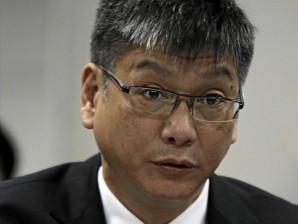
Executive Secretary Paquito Ochoa Jr. FILE PHOTO
MANILA, Philippines—Malacañang bristled at insinuations that it barred Cabinet officials from appearing at Friday’s Senate inquiry because it centered on Puno, President Benigno Aquino’s shooting-range buddy.
Executive Secretary Paquito Ochoa Jr., incoming Interior Secretary Manuel Roxas II, Justice Secretary Leila de Lima and Environment Secretary Ramon Paje skipped the hearing called by the committee on constitutional amendments headed by Senator Miriam Defensor-Santiago.
Secretary Edwin Lacierda, presidential spokesperson, said Malacañang asked the investigating committee to excuse the four Cabinet officials because certain issues, mainly the scope of questions, were not clarified. Otherwise, Malacañang was “willing” to cooperate in the inquiry.
Knowing the scope of questions ahead was necessary because Ochoa was designated officer in charge of the Department of Interior on Local Government after the August 18 death of Interior Secretary Jesse Robredo, and Roxas was appointed Interior Secretary on August 31, Lacierda said.
“This is my question to Renato Reyes: What will they ask Mar Roxas? He’s the incoming DILG Secretary; what does he know at the DILG? Right now, he’s still occupying the DOTC position. That’s the reason why we wanted to ask the scope of the investigation. ES Ochoa, he is just acting OIC. What would you like to ask, about the past?” Lacierda, his voice rising, said in reaction to Reyes’ claim the Cabinet officials were barred from inquiry because Puno was the subject of it.
Besides, Lacierda said, Puno was the focus of the inquiry.
“What did they want to elicit from the Cabinet Secretaries? But we were ready. We didn’t say they should not attend. We were very clear with that,” Lacierda said, referring to Malacañang’s letter to the committee.
Ochoa and De Lima also had to attend a Cabinet cluster meeting in Malacañang Friday morning, Lacierda said.
According to Lacierda, the Cabinet officials sought the President’s consent on whether to attend the Senate inquiry. Eventually, Malacañang decided that certain issues had to be clarified.
These issues, he said, were the “antecedents surrounding the subject matter of the inquiry; individual questions that maybe raised to the Cabinet secretaries; specific provisions of law; and intended objectives of the inquiry.”
“They just wanted a clarification and enlightenment on these, and certainly, the Executive Branch will cooperate,” Lacierda said, later adding: “The good senator should not take this as a position that is adversarial to the investigation or to her evaluation. We certainly do wish to cooperate.”
Lacierda clarified that Malacañang’s move did not constitute an invocation of executive privilege.
He recalled that the Executive Branch authorized the appearance of De Lima and Internal Revenue Commissioner Kim Henares at the impeachment trial of then Chief Justice Renato Corona.
“We are not invoking executive privilege if you’re asking us. Part of EO 464 mentions invocation of executive privilege. We are not doing it,” Lacierda said, referring to the Executive Order 464 that then Arroyo Cabinet members invoked to skip Senate inquiries but whose provisions were later nullified by the Supreme Court.